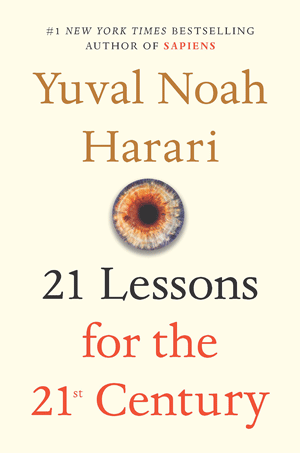Reviewed by NEAL GENDLER
Advances in biotechnology and artificial intelligence are propelling us to enormous social and economic upheaval, possibly even in this century, says Yuval Noah Harari.

His 21 Lessons for the 21st Century is intended “as a selection of lessons” that lack simple conclusions, he says. “They aim to stimulate further thinking and help readers participate in some of the major conversations of our time.”
Such conversations must increase because, he says, we’re running out of time to deal with what’s rushing toward us.
Harari, a Hebrew University lecturer in world history, brilliantly analyzes progress, behaviors and possible consequences, raising questions for which elusive or unknown answers sorely need pursuit.
Each postwar generation was better off than its predecessors, he says, but with coming “technological disruption and ecological meltdown, the younger generation might be lucky simply to stay in place.” Perhaps new social and political models are needed, he says.
Harari argues convincingly that we’re not at all prepared for the confluence of “biotech and infotech,” which threatens to create an upper class with enhanced intellectual and physical capabilities and an enormous, unemployable underclass, its jobs swallowed by computers and machines.
“Ordinary people may not understand artificial intelligence and biotechnology, but they can sense that the future is passing them by.” That may help explain the 2016 election, deviating from the long-accepted liberal story. “In 2018, the common person feels increasingly irrelevant.”
As biologists “are deciphering the mysteries of the human body, and in particular of the brain and human feelings … computer scientists are giving us unprecedented data-processing power,” he says. Merging those “will produce Big Data algorithms that can understand my feelings much better than I can, and then authority will probably shift from humans to computers.”
Determining how to regulate the ownership of data “may well be the most important political question of our era,” Harari says, avoiding “a cornucopia of doomsday scenarios — digital dictatorship to “creation of a global useless class.”
An algorithm, a step-by-step problem-solving procedure, can process data and predict results. Algorithms already track what we see on line, where we go and what we like.
For example: Order a product on line and you’ll likely see suggestions for other products “also ordered” by people who bought what you’re buying. Call up a YouTube video and see the right-side column of videos related to others you’ve watched.
“My illusion of free will is likely to disintegrate as I daily encounter institutions, corporations and government agencies that understand and manipulate what was until now my inaccessible inner realm,” he says.
Scary stuff, making the first half of 21 Lessons riveting. The second half, equally perceptive, deals with politics, religion, knowledge and meaning — more open to argument, especially from religious believers.
Without ridiculing religion, he says that “to the best of our scientific knowledge,” the Bible, Koran and other holy books are human-made stories “to legitimize social norms and political structures,” with many similarities.
His “humility” chapter, subtitled “you are not the center of the world,” criticizes religions for egotism — particularly the religion he presumably knows best.
Jews “are a unique people with an astonishing history,” he says, “yet the truth is that Judaism played only a modest role in the annals of our species,” even if “it begat Christianity and played a modest role in the birth of Islam, two of the most important religions in history.”
He questions whether Jews created monotheism, “from an ethical perspective” a bad idea that did little to improve moral standards and made many people more intolerant.
Our outsized role in science began after 1800, after Jews “abandoned the yeshiva in favor of the laboratory.”
Maybe so, but the book’s provocative second half dampens the drama of a revolutionary wave approaching a humanity apparently little, if any, prepared for it.
Harari doesn’t create the dystopian imaginings of Aldous Huxley or George Orwell, but 21 Lessons is frightening in another way: Have you seen evidence of preparation for this onslaught of change? Or that most people are even aware of it?
***
Neal Gendler is a Minneapolis writer and editor.
(American Jewish World, 11.2.18)




















